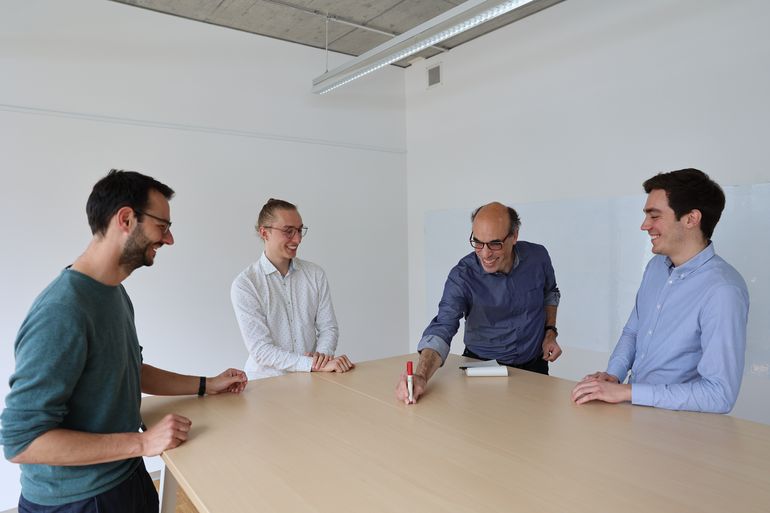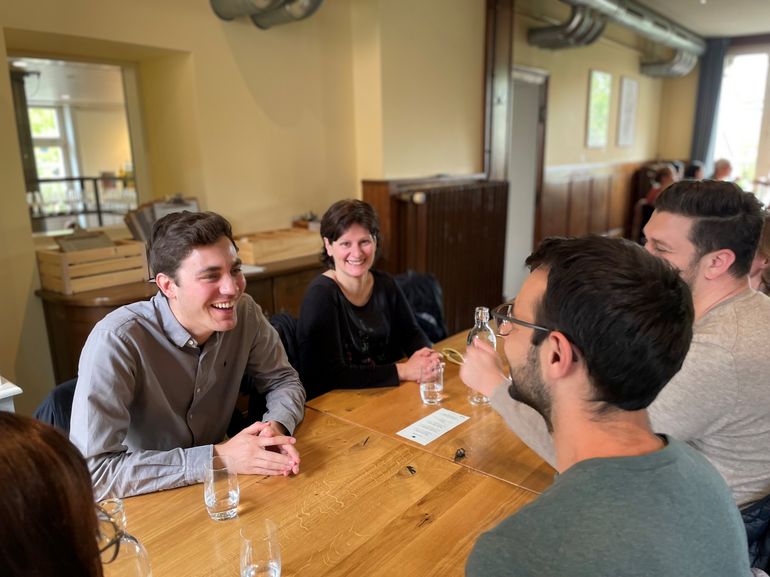For IP professionals
This is the portal for professionals working in the field of intellectual property. Here you'll find direct access to all necessary resources.
Quick links
“I was curious to see how the theory is applied in practice”
Luis Stettler, a law graduate from Lausanne, completed a six-month internship at the IPI in Legal & International Affairs, and Trade Mark Examination and Opposition Proceedings. It was a welcome opportunity for the young man from Western Switzerland to both explore his professional interest in intellectual property and to reconnect with his Bernese roots. He’s particularly interested in copyright issues, including the challenges associated with generative art and new technologies, such as artificial intelligence. He tells us that he’s fascinated by the rate of AI development, the new legal questions raised and the social debate surrounding these technologies.

How did you find out about the legal internship at the IPI?
In my Master’s intellectual property (IP) class, our professor spoke a lot about the IPI as an institution and its role as the federal government’s central point of contact for all questions concerning patents, trade marks, geographical indications of source, design protection and copyright. I was curious to see how the IPI applies the theory in practice. I therefore saw the internship as the perfect opportunity to round off my studies.
I was born in Bern, but I’ve been living in Lausanne for many years. The fact that the IPI is located in Bern also fulfilled my wish to reconnect with my roots. I decided to rent a room in a shared flat in Bern for the duration of my internship to become better acquainted with my home town.
What do you find particularly interesting about intellectual property law?
We all listen to music, read books, go to the cinema, buy products from our favourite brands and use the latest technologies that make our lives easier. I’ve always been fascinated by the ways in which creators, artists and inventors can protect their work. I think that, in our daily lives, we’re not very aware of how important it is to protect these activities and to recognise the efforts put into them.
Although I find all aspects of IP extremely interesting and varied, I do have a preference for copyright and the questions posed by new technologies, such as artificial intelligence. For this reason, I chose to base my final presentation on generative art.
During your internship, you also worked in trade mark protection. What aspects of this work did you find most memorable?
That trade mark applicants are very creative when choosing their trade marks. It’s therefore important that trade mark examiners have a broad general knowledge and that the IPI employs people with varied backgrounds (academic, linguistic, cultural, etc.) for this task. In the trade mark examination section, I really enjoyed carrying out searches that required patience and curiosity. My favourite area of work was in opposition proceedings, where the arguments of the trade mark proprietors are first analysed in order for the IPI to make a decision.

You’re doing your final project on ‘generative art’. Could you explain that in layman’s terms?
For several months now, we’ve all been hearing a lot about new technologies that are based on artificial intelligence (AI) systems and which are capable of generating different forms of art: images, texts, videos and music. Well-known examples include ChatGPT, DALL-E by OpenAI, MidJourney and the New Bing. Users can program rules for restrictions that control the creation of their works or they can let the computer systems generate the output autonomously.
The use of such technologies raises numerous legal, economic and socioethical questions, for example regarding the interaction between IP and other rights, like data protection, personality rights and unfair competition. Huge volumes of data are required to train AI systems (input), which leads to questions about the use of such data. Is the data protected, or can it be used freely? The same applies for the output: Who should the IP rights belong to, if anyone at all? If the output isn’t protected by copyright, can I use it freely? Does the output infringe any existing copyright?
In addition to these legal aspects, there are other economic and socioethical aspects, for example the impact of AI on artistic professions, and discussions about the (decreasing?) value of human-generated art.
What role does AI play in your daily life?
In the future, AI will revolutionise how we learn, how we work and how we use educational materials in the various professions. It is, however, already an inherent part of our daily lives, even if we’re not always aware of it. Despite the fact that these technologies have existed for a number of years, the quality of their output and the speed of their development have increased dramatically in recent months. I find that just as fascinating as the technical and social discourse: the topic of AI has fully entered public consciousness, so to speak. In future, the IPI will have to deal with more and more AI-related questions, especially in regard to copyright.
What were the highlights of your internship at the IPI?
I was very impressed by the diversity of my daily tasks, and my colleagues’ motivation and enthusiasm too. I’ll always remember my visits to the international organisations, the WTO and WIPO in Geneva. I got to see how international meetings are conducted first-hand, and I was particularly fascinated by the diplomatic procedures. Moreover, I’m extremely interested in the international side of IP, which is vital for reaching harmonised solutions and agreements. With regard to my colleagues, I particularly enjoyed the moments we shared at lunchtime and the activities that allowed us to learn more about each other’s lives in a more informal setting.

Why would you recommend the legal internship at the IPI to anyone interested?
At the start of the internship, there are regular inductions to each unit at the IPI, where the employees take the time to explain what they do and what you can do as an intern. You really get a taste of everything. If you find an area particularly interesting, you can also ask to take on more of those kinds of tasks. As an intern, I received purely constructive feedback and I was able to improve in many areas. You can tell that the IPI places great importance on training its interns.
Do you have any plans for your career after your internship?
Ideally, I’d like to complete an internship as a trainee lawyer and then sit the bar exam, which would be the culmination of all my years of studying law. But first, I’d like to gain more experience in the field of IP by finding an internship or job in Switzerland or even abroad. So I’m looking out for new career opportunities.
What are your other interests or hobbies?
I enjoy going to concerts and festivals and I’m very interested in the music industry in general. Copyright fosters an understanding of how the process of creating music can be ‘regulated’ and the importance of each individual’s role in that process, be it a musician, composer, lyricist, performer, collective rights management organisation or consumer. I think that once you understand how that works, it adds a whole new dimension to the listening experience.

